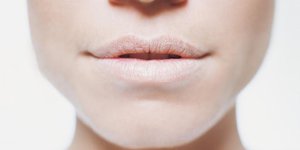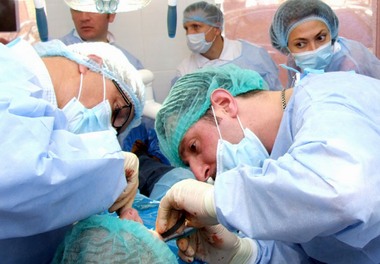One of the most common complaints when various diseases is dry mouth. These are possible diseases of the digestive system, acute diseases abdominal organs that require surgical intervention, diseases of the nervous and cardiac systems, diabetes mellitus, endocrine and metabolic disorders. Diagnosis and correct definition of this symptom can be one of the main criteria for treatment.
Why does dry mouth occur?
There are many reasons for dry mouth. The natural hydration of the oral mucous tissues with saliva depends on many factors. A strong feeling of dry mouth can be caused either by impaired perception of the presence of saliva in the oral cavity, or by its quantitative and qualitative violation composition. Main reasons The appearance of dryness can be:
- Disturbances in the mucous membrane oral cavity trophic processes;
- Significant changes in sensory receptors in the mucosa;
- Mechanical drying of the oral cavity with air;
- Increased osmotic blood pressure;
- Disturbances in the body's balance of electrolytes and water metabolism;
- Humoral and nervous regulation saliva formation;
- Internal intoxication and the effect on the body of toxic elements from the external environment.
Probable diseases, which causes dry mouth:

Important: Most common cause permanent dry mouth in people of average and young when she's not there probable causes for appearance, diabetes mellitus is considered. Therefore, first, it is necessary to eliminate this problem.
When diabetes is not diagnosed, by detailing the dryness and its combination with other symptoms, subsequent diagnostic testing can be carried out.
Dryness in the morning
There are cases when dry mouth develops only in the morning. Most often this indicates problems that are associated with local symptoms or are a natural effect on the body external factors. Dry mouth in the morning ends itself after a certain time after waking up. Because main reason its appearance is mechanical drying of air during night rest during mouth breathing (problems with breathing through the nose, snoring). Almost always, after abusing alcoholic beverages, dryness develops in the morning.
Dryness at night
Dry mouth at night needs to be determined in more precise detail, since the reasons for its formation are much more serious, unlike in the morning. This is possible as usual overeating before bed or drying out the mucous membranes in the air, as well as diseases nervous system. At night for any person saliva production decreases, and during disturbed innervation of the salivary glands, this process is disrupted even more strongly. In some cases, persistent dryness at night indicates chronic diseases internal organs abdominal cavity.
Other causes of dryness
You can't just look at dryness alone. It is imperative to pay attention to other signs that sometimes accompany it. Correct definition Combinations of symptoms with dry mouth can help determine the real cause of its formation.
Weakness
When dryness is accompanied by general weakness of the body, then one thing can be stated: the causes of the manifestation clearly have a serious origin. Moreover, this is relevant during their constant progression. These people definitely need a comprehensive study. Since, ultimately, even the most dangerous diseases at the initial stage of appearance, which is a good reason for their treatment.
Weakness that is combined with dryness, maybe when:
- toxicoses of purulent and cancer origin;
- external intoxication;
- diseases of the peripheral and central nervous system.
Viral and infectious diseases and illnesses can manifest themselves in the same way. circulatory system(lymphoma, leukemia, anemia). Cancer patients after surgical intervention or aggressive chemotherapy may also feel weakness, which is combined with dryness.
White tongue
 Doctors say about the tongue that it is a reflection of the abdominal cavity. And in fact, from the characteristics of the coating on the tongue you can learn a lot about digestive system. As a rule, pathological data combined with dry mouth. This combination of symptoms may indicate diseases of the intestines, stomach and esophagus. Such diseases include: gastroesophageal reflux disease and reflux esophagitis, gastroduodenitis and gastritis, enterocolitis and colitis, peptic ulcer duodenum and stomach.
Doctors say about the tongue that it is a reflection of the abdominal cavity. And in fact, from the characteristics of the coating on the tongue you can learn a lot about digestive system. As a rule, pathological data combined with dry mouth. This combination of symptoms may indicate diseases of the intestines, stomach and esophagus. Such diseases include: gastroesophageal reflux disease and reflux esophagitis, gastroduodenitis and gastritis, enterocolitis and colitis, peptic ulcer duodenum and stomach.
If strong painful sensations in the stomach are combined with a white coating on the tongue and dry mouth, then this is an accurate symptom of a complex disease. These diseases include stone and simple cholecystitis, appendicitis and different kinds complications, intestinal obstruction and perforated gastric ulcer, pancreatic necrosis and pancreatitis. In these cases, no improvement should be expected. Treatment must be urgent and may even require surgery.
Bitterness on the lips and in the mouth
Several mechanisms may be to blame for the appearance of bitterness, which is combined with dryness. Firstly, it may be related with dysfunction of the biliary system, secondly, with disruption of the stomach regarding evacuation and secretion of hydrochloric acid And gastric juice. In both cases, acidic foods or bile are retained. The result of this stagnation is the absorption of their decomposition products into the blood, which can affect the quantitative and qualitative parameters of saliva.
Bitter substances are also directly deposited on the mucous membranes of the lips and membranes. Symptoms of the disease may include dyskinesia of the biliary system, chronic and acute cholecystitis, gastritis and stomach ulcers, chronic toxic and viral hepatitis, chronic diseases pancreas, which cause disruption of bile excretion.
Nausea
The combination of nausea and dryness is common. Typically, the reasons for combining them are food poisoning And intestinal infections . These pathologies can appear even before full-blown clinical picture in the form of vomiting and diarrhea. Also, nausea and dryness often appear as a result of banal overeating or errors in diet.
This combination of symptoms cannot be accurately diagnosed. Secondary symptoms such as indigestion and stool disorders and abdominal pain must also be assessed. Only one thing can be determined with certainty - the combination of dryness and nausea indicates problems with the digestive system.
Dizziness
When dizziness is added to dryness, this is always a sign of concern. Since it indicates a breakdown in the automatic mechanisms of regulation of blood circulation in the brain and its involvement in the process. It could be either in early brain disease, which is accompanied by dizziness with dryness, or with any other diseases that cause intoxication or dehydration.
In the latter case, the manifestation of an alarming combination of symptoms appears after a direct disruption of brain function, and as a result, the inability to keep the body upright. Moreover, the procedure for normal salivation is disrupted, and this is manifested by dryness. Primary changes in the body that are not related to the brain appear during a decrease in the amount of circulating blood, as a result of which its blood supply decreases. Moreover, those pathological manifestations that occur for secondary brain damage.
Frequent urination
Frequent urination and dry mouth raises several concerns. The first of them is kidney diseases. Chronic processes of inflammation of these organs are directly related to water balance, determining the amount of urine output and the feeling of thirst. The second reason is diabetes.
Mechanism of combination of features frequent urination with dry mouth can be explained this way. Increase in glycemia ( high sugar in the blood) leads to high blood osmotic pressure. As a result, fluid is constantly attracted from tissues into vascular system. An increase in the amount of fluid in the blood causes dry mucous membranes and a feeling of thirst, while forcing the kidneys to remove excess fluid from the body.
Dryness during pregnancy
The normal course of pregnancy is rarely accompanied by severe symptoms. At this time, pregnant women may have any complaints, but they all have inconsistent symptoms without disturbing your overall well-being. Periodic dryness during pregnancy is no exception. But when this symptom becomes progressive and protracted, this is always a signal for alarm. It may indicate a woman’s lack of water and nutrition, or an exacerbation of a chronic disease.
But you need to worry not so much about such conditions as about possible toxicosis. If it appears during the beginning of pregnancy, then it is not very scary. However, late toxicosis (preeclampsia) constantly causes fear for the life of the mother and her child. Therefore, any pregnant woman should know that dry mouth, which is combined with vomiting, nausea, swelling and increased pressure, is the first sign of gestosis. There is no need to expect your body to improve on its own. Definitely necessary seek help from a doctor.
Since dry mouth can be the first symptom of quite serious diseases, including diabetes, you should not ignore it. If you feel this unpleasant sensation almost all the time and do not see what is causing this disorder, be sure to conduct a detailed examination and determine the factor that provoked it.
Xerostomia or dry mouth is an unpleasant symptom that affects many people. According to medical statistics, ten percent of the entire world population suffers from this disease at regular intervals.
However, why does severe dry mouth form and what does such a condition threaten a person with? We will analyze the answers to these questions in this material.
Every person can be familiar with the feeling of dry mouth. This symptom can be either temporary or permanent.
Dryness is not an independent disease, but is a symptom of certain types of disease in the body.
The disease is characterized by a decrease or cessation of saliva production. This condition occurs due to many reasons.
Saliva is necessary to protect the body from harmful bacteria, as well as:
- acid neutralization;
- digestion of food;
- helps moisturize the mouth and throat;
- saturates tooth enamel with mineral components,
Lack of saliva production may be due to exhaustion or loss of vitality salivary glands. In addition, there are the following diseases:
- Diseases of the nervous system.
- Inflammation respiratory tract.
- Inflammation of the digestive tract.
- Disease of the food tube.
- Processing dysfunction nutrients.
- Poor absorption of vitamins into the blood.
- Gastritis.
- Inflammation of the gallbladder.
- Disease of the duodenum.
- Autoimmune diseases.
In addition to the described symptoms, the absence of saliva may be associated with a long use of antibiotics or other medical supplies . It can also be a symptom of exacerbation of chronic diseases.
Interesting fact: per day human body produces about two thousand milligrams of saliva.
Symptoms of the disease
In any case, dryness is a symptom of serious illness, which cannot be ignored. If you have difficulty breathing and have a dry mouth for a long time, pay attention to your health and read the following symptoms:

Dry mouth is accompanied by other symptoms. This indicates violation of any organ. Pay attention to common symptoms:
- a constant feeling of thirst;
- excessive urination;
- pain when eating;
- lip inflammation;
- cracks in the corners of the mouth;
- viscosity in the mouth;
- dry tongue;
- change in the taste of products;
- bad breath.
In this case, you need to consult a doctor, otherwise it is fraught with inflammation such as loss of vitality and absolute dysfunction of the mucosa. That is why the patient needs to contact to a qualified doctor to make an accurate diagnosis and determine a course of treatment.
Main reasons
There are many reasons why saliva flow may be impaired. It is known that temporary dysfunction of the salivary glands can be caused by prolonged use of antibiotics or after excessive consumption of alcoholic beverages.
 The group of medications includes the following types:
The group of medications includes the following types:
- All types of antibiotics.
- Medicines against.
- Sedatives in the form of drops and tablets.
- Antidepressants.
- Antihistamines.
- Painkillers.
Provided that a person has had an infectious disease, dry mouth usually goes away quickly. However, if you use medications for a long time and general poisoning of the body with toxic substances, consult a specialist.
It is known that the causes of dry mouth in children are similar to those in adults.
Provided that dry mouth varies in duration, the patient is likely to develop inflammation.
Main causes of inflammation the following:
- mouth breathing;
- deviated nasal septum;
- education ;
- seasonal allergic rhinoconjunctivitis;
- allergic rhinitis;
- infectious inflammation;
- diseases of internal organs;
- HIV infections;
- hypotension;
- rheumatoid arthritis;
- dehydration of the body.
If you have recently had surgical interventions The dry mouth is probably related to the operation.
Many people are interested in what disease can cause dry mouth at night. This may be caused, for example, by snoring or due to mouth breathing.
Pathological conditions
If the reasons described are not possible, the most likely symptom of dry mouth is pathological conditions. These include:

Infectious diseases
Pay attention to infectious inflammations. Usually, with the flu and colds, the body becomes dehydrated, and, as a result, with a cold, dry mouth is a common symptom.
Also given the symptom is observed in diseases such as: 
- traumatization of the major salivary glands;
- lack of vitamins;
- height epithelial tissue, which clogs the lumens of the salivary glands;
- depression or stress;
- surgical interventions in the nasopharynx area;
- genetic pathologies.
Dry mouth during pregnancy
While expecting a baby, future mom experiences various inflammations. However, xerostomia usually does not manifest itself, since during pregnancy salivary glands work more actively than usual.
 However, if you are pregnant and have noticeable dryness, contact to a specialist.
However, if you are pregnant and have noticeable dryness, contact to a specialist.
The situation worsens if a sensation of metallic taste is created. In this case, it may be the cause of diabetes.
One should not ignore the fact that during pregnancy, expectant mothers experience problems with urination. In this case, the body usually simply does not have enough fluid, and timely no replenishment occurs.
It is for this reason that pregnant women should take plenty of water. And also exclude spicy and sweet foods from your diet.
Conclusion
In order to get rid of dry mouth, try to drink plenty of water and also eat vegetables and fruits, especially lemon.
In addition, it is allowed to eat candy, but without sugar, or chew menthol gum.
Xerostomia- This dry mouth, which appears when saliva production decreases or stops.
Xerostomia can be caused by a disease of the salivary glands, a malfunction in the areas of the nervous system responsible for the production of saliva ( neurogenic character), dysfunction of the nervous system, age-related atrophy of the salivary glands.
At the beginning of the development of xerostomia, patients complain of itching of the oral mucosa. If dryness is not controlled, the mucous membrane atrophies, cracks appear on it, and the color becomes bright. Multiple lesions are often observed, affecting the lower parts of the tooth. The throat also feels dry.
Causes
Dry mouth is a common symptom, which does not always indicate trouble, but sometimes indicates serious illness.Possible causes of dry mouth:
1.
Side effect of taking certain medications
. This effect is not uncommon for drugs sold both with and without a prescription. Dryness can be caused by drugs against, antidepressants, painkillers, drugs prescribed for, for therapy, mental disorders, enuresis, bronchodilators, for diarrhea and vomiting. In addition, some sedatives and muscle relaxants have the same effect.
2.
A number of infectious diseases, as well as diseases of internal organs
, including: HIV, Schergen's syndrome, mumps, rheumatoid, Alzheimer's disease.
3.
Side effects with a number of therapeutic methods
. Decreased saliva production may occur after radiation to the head or chemotherapy for cancer.
4.
Disturbance of innervation
. During surgery or injury, the integrity of the nerves in the neck or head may be compromised.
5.
Dehydration
. Drying of the mucous membranes can occur with dehydration accompanying fever, diarrhea, vomiting, thermal skin lesions, blood loss, and increased sweating.
6.
Loss of salivary glands
due to surgery.
7.
Some bad habits
, for example, addiction to nicotine.
8.
Mouth breathing
.
Signs
By the following signs can be determined pathological condition, called "dry mouth":- strong desire to drink,
- feeling of stickiness and dryness in the mouth,
- cracks in the corners of the mouth and on the red border of the lips,
- dry throat,
- the tongue itches, it is hard and red,
- it becomes awkward to speak, hard to swallow,
- the taste perception of food decreases,
- the voice becomes hoarse
- my nose is dry
- your throat may hurt
- stench in the mouth.
Consequences
First of all, this is a very unpleasant phenomenon that significantly worsens the quality of life. The presence of a certain amount of saliva in the mouth prevents the development of pathogenic microbes. Therefore, with dry mouth, the likelihood of developing candidiasis, caries, gingivitis and other diseases increases.The process of using dentures becomes very unpleasant and difficult.
In the morning or at night
Dry mouth at night and after waking up may indicate the presence of the following disorders:1. Poisoning of the body. Including ethanol-containing drinks. This often happens after drinking a fair amount of alcohol, as well.
2. Impaired nasal breathing. This may also be a consequence of tumors of the nasopharynx or snoring.
Dryness and bitterness in the mouth
These symptoms are characteristic of diseases bile ducts or gallbladder, but can accompany almost any disease gastrointestinal tract.A combination of dry mouth and bitterness can be observed during treatment with certain drugs, including antiallergic and antibiotics.
Violation of the movement of bile along the biliary tract can occur with, duodenitis,.
Very often, similar symptoms are observed in patients with neurotic disorders, amenorrhea.
Often, dryness and bitterness in the mouth become the first symptoms of cholecystitis and. In this case, the patient simultaneously complains of pain in the right side, which becomes more active after drinking alcohol or doing physical work.
Motor function is impaired biliary tract In both diseases and hyperfunction, the release of adrenaline into the blood increases, which leads to spasm of the smooth muscles of the ducts.
Many oral diseases are accompanied by dry mouth and bitterness. Inflammatory processes gums may also cause an unpleasant metallic taste or burning of the gums or tongue.
Nausea and dryness occur with Helicobacter gastritis
The causative agent of the disease is a microorganism Helicobacter pylori penetrates the digestive tract with secretions of a sick person, contaminated food or poorly processed medical instruments. In the digestive organs of any person there is a little urea, from which the blood is cleansed. It is evacuated from the body with feces.Most symptoms of IBS relate to the gastrointestinal tract, but when digestion is disrupted, the entire body suffers. Prolonged diarrhea provoke dehydration - so the patient feels dry mouth.
Main signs of IBS:
- pain in the epigastrium after eating, which goes away immediately after excretion of feces,
- , often after eating before lunch,
- belching, feeling of a “lump” in the stomach.
Usually the condition worsens after anxiety or physical stress.
Side effect of taking antibiotics
Antibiotics cause very different side effects, including dry mouth, diarrhea, constipation, rashes.Dry mouth may occur a few days after you start taking the drug and go away approximately a week after finishing treatment. Intensity discomfort depends on the following factors:
- qualities of the drug,
- dosages,
- body reactions to the drug,
- duration of therapy,
- dosage form.
- take the drug at certain hours, do not miss a dose or take it ahead of time, this will help avoid jumps in the concentration of the drug in the tissues,
- drink only clean water or weak tea,
- Be sure to take probiotics throughout the course of antibiotic treatment. Many side effects of antibiotics are associated with disruption of the intestinal microflora, including dry mouth, which can be accompanied by diarrhea and dehydration. Eating probiotics will help avoid...
- observe . During antibiotic treatment, you should follow a gentle diet: eat light food, do not drink alcohol, do not eat fried or fatty foods. Do not take the drug with food, strictly follow the instructions.
For diabetes
Dry mouth is one of the most well-known and common symptoms of diabetes.In addition, the following symptoms are observed in diabetes:
- constant thirst,
- copious urination,
- sudden change in weight in any direction,
- skin itching,
- migraine-like pain,
- “jams” in the corners of the mouth,
- lethargy.
For pancreatitis
Xerostomia is one of the signs of chronic pancreatitis or inflammation of the pancreas. The disease is very insidious and can proceed almost unnoticed. Even after it seems complete cure inflammation can proceed latently for at least six months.At chronic pancreatitis the body does not absorb many beneficial substances from food. Lack of iron and other microelements leads to cracks in the corners of the mouth, drying of the dermis, dullness of nails and hair. The stool in such patients is usually unformed.
Very often, patients suffer from pain in the left side of the abdomen that appears after eating. But pain may appear several hours after eating, especially if the patient’s diet consisted of fatty or spicy foods.
Appetite decreases, nausea and vomiting, belching, and flatulence are often observed.
Dry mouth, weight loss and diarrhea are typical for exacerbation chronic form pancreatitis.
To prevent exacerbations, it is important to carefully select your diet.
During menopause
During menopause, the work of the sex glands gradually fades away, and a decrease in the level of sex hormones inevitably affects the condition of the whole organism.The function of the autonomic nervous system changes, which is why dizziness, dry mouth, defecation disorders, frequent urination, and chest discomfort appear.
All these unpleasant symptoms are usually not too pronounced, so the vast majority of women get used to them and do not feel sick. However, if a woman has suffered a serious, serious illness or injury, then menopause can be very painful and in this case it is called climacteric syndrome.
All mucous membranes dry out: mouth, eyes, throat. Swelling, joint and heart pain may occur. Very often, the pain becomes more active after bad sleep, emotional outburst.
Majority unpleasant symptoms goes away or is alleviated with balanced exercise and sufficient rest. Very helpful fasting days which need to be done once a week, you can also fast, but not more than once every 14 days and no longer than one day without the supervision of a doctor.
Multivitamins containing complex B, C, A, E improve the condition. You can drink them for 21 days, after which you rest for 21 days and repeat again. Very good at normalizing the state of the vegetative-vascular system sedatives based on plants: motherwort, valerian. You can drink them completely without danger to your health for a month, after which you take a break for the same period and repeat the treatment. Up to six courses of treatment can be carried out.
For HIV
Dry mouth, as well as severe diseases of the oral mucosa, often accompany patients with HIV. About thirty percent of HIV patients have certain diseases of the mucous membranes of the mouth, since they are not strong. Despite the fact that, compared with other ailments associated with HIV, dry mouth is not at all dangerous, xerostomia can significantly impair the quality of life and be a good breeding ground for the development of other more serious symptoms. serious illnesses oral cavity. If the oral mucosa is dry, it is difficult to chew and swallow food, and taste perception may deteriorate.Many people, against the background of this symptom, begin to eat worse, but this cannot be allowed - the body must receive a sufficient amount of nutrients. Saliva is necessary for proper digestion of food, it also prevents the development of caries. When the mucous membranes are dry, the lips also feel bad – they dry out, crack, and itch. Dry mouth can be successfully combated, including with HIV.
Treatment with home remedies
1. Drink 10 drops of echinacea alcohol tincture every hour. Duration of treatment – no longer than 2 months.2. Add some red chili pepper to your food. It contains the substance capsaicin, which activates the salivary glands.
3. You can suck on small ice cubes.
4. Make food more liquid and moist with sauces. Food should be taken at room temperature, soft.
5. Avoid crackers, bread, nuts, and dried fruits.
6. Lubricate lips with moisturizing balm.
How to increase saliva production?
- Drink more fluids
- Chew gum or suck candy, but without sugar,
- To cleanse the oral cavity, use fluoride-containing toothpastes and rinses,
- Eat less salty
- Quit smoking and alcohol,
- Control nasal breathing: do not breathe through your mouth,
- To ensure that the indoor air is sufficiently humid, you can use special humidifiers,
- Exist pharmaceutical drugs– saliva substitutes.
Dry mouth occurs due to insufficient secretion production by the salivary glands. In medicine this state called xerostomia. This is not a disease, but a symptom various diseases. The cause of dry mouth is the use of certain medications and diseases of the internal organs. Often with xerostomia, an unpleasant odor appears from the mouth.
Common Causes of Xerostomia

The function of the salivary glands can be impaired by excessive consumption of coffee and alcohol.
Another common cause of dry mouth, burning, sore throat or lump in the throat, especially in the morning, is excessively dry indoor air. Lack of moisture also manifests itself as dryness skin. U indoor plants The tips of the leaves curl and turn yellow.
As a rule, air humidity is lower in winter when the heating is turned on. Newly made concrete panels absorb a lot of moisture from the air, which can also ultimately cause your mouth to feel dry.
During the day, the body naturally releases up to 500 ml of water through the skin. But if the air is dry, moisture loss increases.
Air humidity of 40 to 60 percent is considered comfortable and necessary for health. At lower levels, the air must be artificially humidified.
Drugs cause dry mouth

Some drugs used to treat allergic diseases, at the same time have a sedative effect, helping to fall asleep at night. At the same time, having a long-term effect, they cause dry mouth in the morning, headache, drowsiness.
Typically, these side effects cause antihistamines first generation:
- Diphenhydramine: urinary retention, cause of dry mouth, severe drowsiness;
- Tavegil: nausea, dry mouth, constipation, headache;
- Fenkarol: painful digestion, dry mouth.
First generation antihistamines can impair concentration and cause skin rashes, tachycardia, low blood pressure.
Some women are prescribed antidepressants for depression - e.g. fluoxetine. Antidepressants can also cause side effects: dizziness, blurred vision, sleep disorders, sexual problems, problems with bladder, cause dry mouth.
The cause of decreased salivation may be poisoning by certain medicines, For example, atropine or ephedrine. At drug poisoning there is a strange smell from the mouth.
To neutralize poisoning, you should not drink milk, since many drugs are highly soluble in fat. Once absorbed into the body along with milk, they aggravate the poisoning.
It is better to drink a few glasses of water, add a little salt or mustard in powder form. A pinkish solution of potassium permanganate is suitable, but it must be filtered so that the crystals do not end up in the stomach.
After taking the liquid, you must induce vomiting. Repeat the procedure several times. After accepting Activated carbon at the rate of one tablet per 10 kg of weight.
Causes of dry mouth in various diseases

Chronic rhinitis. Prolonged exposure to chemical, thermal, mechanical (dust) irritants can lead to chronic rhinitis, which manifests itself as a constant runny nose.
The nose is constantly stuffy, especially when lying down, mucus is released from the nostrils. The sense of smell is reduced, the head often hurts, and the mouth is dry.
Stomatitis. IN mild form catarrhal stomatitis it burns the oral mucosa, it becomes red, and tooth marks remain on the swollen inner surface of the cheeks. The mouth feels dry, and chewing is painful due to the inflamed mucous membrane. In the hemorrhagic form, small hemorrhages form on the mucous membrane.
At erosive and ulcerative stomatitis Bubbles appear, which burst, revealing a whitish coating. Dry mouth increases, saliva is almost not produced, and the lymph nodes are enlarged.
Sjögren's syndrome. The disease affects the exocrine glands of the body, which secrete that other product - for example, salivary or lacrimal glands. Often this disease affects women aged about 40 years.
Sjogren's syndrome is manifested by a burning sensation in the eyes, the eyelids and conjunctiva turn red, and photophobia appears. The salivary glands stop producing enough secretions, which causes dry mouth.
At first, the lack of moisture is detected only with strong excitement or conversation, but over time it becomes permanent. The salivary glands are enlarged and painful to touch. The lips are dry, with cracks in the tongue.
Due to lack of saliva, caries. The lymph nodes enlarged on the neck and under the jaw. The throat becomes sore, a constant dry cough appears, and dry crusts form in the nasal cavity.
Gastritis. Dry mouth can be caused by acute gastritis. My stomach hurts, I feel dizzy, nauseous, and have loose stools. , there is not enough moisture in the mouth or, conversely, copious department saliva.
Pyelonephritis. In the case of this inflammatory disease Kidney function is reduced, which causes thirst, dry mouth, and increased urine output at night. In the mouth bad taste, especially in the morning. Flatulence, Blunt pain in the lower back.
Hepatitis. The cause of liver inflammation is one or another virus. Dry mouth and dull pain in the liver area appear. Appetite is reduced, stool is upset.
How to eliminate dry mouth with a folk remedy

For xerostomia, infuse for 45 minutes in 300 ml boiled water room temperature 2 tsp. marshmallow roots, strain. Take 1 tbsp. from 3 to 6 times a day for one and a half months.
In the case of Sjögren's syndrome, treat with two-month courses 3 times a year.
To stimulate the nerve endings in the cheeks, as well as the salivary glands, and prevent dry mouth, it is useful to perform the “Tongue Sticking Out” exercise:
- Open your mouth slightly.
- Stick out and hide your tongue, move your tongue freely left and right, close your front teeth. Repeat each movement 7-8 times.
Dry mouth (xerostomia) is dryness of the oral mucosa due to a decrease or cessation of secretion of the salivary glands. Chronic dry mouth makes it difficult for a person to speak, chew, swallow and taste, all of which generally makes life quite uncomfortable.
Typical signs of this condition are:
- Feeling of “stickiness” and dryness in the mouth
- Increased thirst
- Areas of irritation on the oral mucosa; cracks on the lips and corners of the mouth
- Feeling of dry throat
- Burning or itching in the mouth (especially on the tongue)
- The tongue turns red, becomes dry and rough
- Difficulty speaking taste sensations, chewing and swallowing
- Hoarseness, dry nasal mucosa, sore throat
- Bad breath
The oral mucosa can react to various pathological processes and functional disorders in many body systems.
Causes of dry mouth not related to illness
1. Insufficient drinking regime (with a shortage of water, in hot weather, when eating highly salted foods).
2. The use of a significant number of different drugs (antitumor drugs, atropine, psychotropic drugs, diuretics, a group of sympathomimetics, etc.) has this effect side effect like dry mouth. Even antihypertensive, vasoconstrictor and antihistamine drugs help reduce saliva production.
3. When breathing through the mouth (in elderly people at night while sleeping with open mouth due to weakness of the adductor muscles lower jaw to the top, with difficulty in nasal breathing due to polyps of the deviated nasal septum, etc.).
4. Frequent, unnecessary rinsing of the mouth.
5. Smoking.
6. Alcohol intoxication.
7. Menopause.
Diseases that cause dry mouth
1. Diseases of the salivary glands(mumps, sialadenitis, sialolithiasis, sialostasis, Mikulicz's disease). Common signs For each of these pathologies, there is a violation of the secretion of saliva, up to complete cessation, soreness of the gland, its enlargement, salivary colic (pain in the area of the salivary gland while eating), swelling in the area of the salivary gland.
2. Infectious diseases . Dry mouth occurs as a result of elevated temperature body and sweating (flu, sore throat, etc.), and due to significant loss of fluid through vomit and feces (cholera, dysentery, etc.).
3. Endocrine diseases . Diabetes mellitus is a disease based on an absolute or relative lack of insulin in the body, causing disturbances in carbohydrate and other metabolic processes in organism. Characteristic symptoms Overt diabetes mellitus is thirst, dry mouth, weight loss, weakness and polyuria (increased amount of urine excreted). The volume of urine excreted per day can be 3-6 liters or more. Thirst and dry mouth are associated with a decrease in fluid in the body and suppression of the function of the salivary glands.
Thyrotoxicosis is a pathological condition of the body that develops due to increased levels of hormones in the blood. thyroid gland. Thyrotoxicosis is a complication of diffuse toxic goiter, thyrotoxic adenoma, multinodular hyperthyroid goiter. Patients complain of a feeling of fear, increased irritability, sleep disturbance, tremors of the arms and the entire body, tachycardia, sweating, frequent diarrhea, vomiting, dry mouth, loss of appetite. Xerostomia occurs due to metabolic disorders and increased excretion of fluid from the body.
4. Neoplasms of the oral cavity(malignant and benign). The parotid and submandibular salivary glands are most often affected. Benign tumors most often located in the gland tissue, but can also be superficial. They are painless formations with a smooth or coarsely lumpy surface, dense elastic consistency, with a clearly defined capsule. Malignant tumors They are a dense, painless nodule or infiltrate in the gland, without clear boundaries. As the disease progresses, pain appears. The tumor quickly spreads to surrounding tissues and organs and gives regional metastases. In case of defeat parotid gland paralysis sets in facial muscles. Dryness of the oral cavity can be observed both due to the presence of the tumor itself (destruction, compression of the gland tissue and its ducts), and as a complication radiation therapy oncological processes maxillofacial area due to the direct effect of ionizing radiation on the neurosecretory apparatus and gland tissue.
5. Retinol deficiency(vitamin A) is manifested by paleness and dryness of the skin, its flaking, and a tendency to pustular lesions. There is dryness and dullness of hair, dry mouth, photophobia, conjunctivitis, blepharitis, frequent illnesses respiratory tract, brittle and striated nails, cracks in the corner of the mouth, hyperkeratosis (increased keratinization) of the oral mucosa. Vitamin A deficiency leads to severe violations epithelium, in which a change in the course of physiological regeneration (recovery) occurs and its atrophy develops. Increased desquamation of newly formed epithelium excretory ducts salivary glands leads to blockage and the formation of retention cysts. The secretion of saliva slows down, although the gland tissue itself is not affected.
6. Pathological processes leading to increased fluid loss: external and internal bleeding, massive burns, increased body temperature, frequent persistent diarrhea and vomiting, increased sweating.
7. Surgical removal salivary glands carried out for extensive injuries, oncological processes, and chronic inflammatory diseases, if other treatment methods have been ineffective.
8. Injuries of the major salivary glands. Dry mouth is observed when the parotid, submandibular, and sublingual areas are injured. Trauma can lead to rupture of the tissue and ducts of the gland, which can cause disruption of the formation and release of saliva into the oral cavity.
9. Nerve damage(mainly glossopharyngeal and facial cranial nerves), contributing to the work of the salivary glands or the center of salivation (nuclei of the facial and glossopharyngeal nerves in the medulla oblongata).
10. Anemia. Iron deficiency anemia is characterized by pallor of the skin and mucous membranes, weakness, physical fatigue and mental lethargy, shortness of breath when moving, frequent dizziness, tinnitus, dry mouth, perversion of taste (addiction to chalk, coal, lime).
11. Nervous overexcitement. Excitement, stress, high psycho-emotional stress sometimes cause dry mouth in people with increased nervous excitability. Dry mouth goes away along with symptoms of stress.
12. Systemic diseases.
Systemic scleroderma is a polysyndromic disease manifested by progressive fibrosis of the skin, internal organs (heart, lungs, gastrointestinal tract, kidneys) and vascular pathology such as obliterating endarteritis with widespread vasospastic (reduction of the lumen of blood vessels due to contraction of the smooth muscles of their walls) disorders. The clinic reflects a specific skin lesion that changes appearance the patient (mask-like face, sclerodactyly) and various body systems (polyarthralgia, esophagitis, peptic ulcers, pneumosclerosis, cardiosclerosis, glomerulonephritis, etc.), symptoms progress over time. Osteolysis is a common symptom nail phalanges, which leads to shortening and deformation of the fingers and toes. Damage to the mucous membranes is manifested by dryness in the oral cavity, thickening and shortening of the frenulum of the tongue. Scleroderma is often combined with Sjögren's syndrome.
Sjögren's disease– a systemic autoimmune disease characterized by dry mucous membranes caused by lymphoid proliferation of the exocrine glands.
Sjogren's syndrome is a symptom complex characterized by a combination of signs of damage to the exocrine glands (usually salivary and lacrimal) with a number of autoimmune diseases.
The course of the disease and Sjogren's syndrome are identical. However, the disease occurs as an independent disease, and the syndrome occurs in combination with rheumatoid arthritis, systemic lupus erythematosus, systemic scleroderma and other diseases. Manifestations of pathology can be divided into systemic damage (recurrent non-erosive arthritis, myositis, interstitial nephritis etc.) and symptoms associated with hypofunction of the exocrine glands (dryness of the mucous membranes of the oral cavity, nasopharynx, trachea, eyes, vagina, gastrointestinal tract). Patients complain of itching, burning, eyelid pain, and photophobia. Recurrent may develop bacterial conjunctivitis. Damage to the salivary glands leads, most often, to the development of chronic parotitis, accompanied by pain, swelling of the tissue of the salivary glands, and an increase in body temperature to 38 - 40 ° C. On late stages there is a sharp dry mouth, inability to speak, swallow food without adding liquid.
Cystic fibrosis – hereditary disease, characterized systemic damage exocrine glands, manifested by severe dysfunction of the respiratory organs, gastrointestinal tract and a number of other organs and systems. The disease manifests itself already in the neonatal period. With a good appetite, children do not gain weight, there is a paroxysmal cough, dry oral mucosa, and viscous saliva. There is constant shortness of breath and cyanosis.
Diagnosis of dry mouth
When examining a patient, they clarify childhood diseases (mumps), what medications he is currently taking, and bad habits. The area of the salivary glands is examined and palpated. Based on the data already received, the doctor makes a presumptive diagnosis and determines the tactics for further examination.
Laboratory and instrumental examination for dry mouth
1. general analysis blood (decrease in hemoglobin and number of red blood cells with iron deficiency anemia, scleroderma, increase in leukocytes in inflammatory diseases);
2. general urine analysis - microhematuria (the appearance of red blood cells in the urine), proteinuria (protein in the urine), cylindruria, leukocyturia in systemic scleroderma;
3. blood glucose (normal 3.3-5.5 mmol/l, an increase in glucose levels indicates a possible diabetes mellitus);
4. Blood for thyroid hormones: T3, T4, TSH. With thyrotoxicosis, the level of T3, T4 increases and TSH decreases;
5. Biochemical analysis blood: retinol for vitamin A deficiency below 100 mcg/l, carotene – below 200 mcg/l;
6. ELISA ( linked immunosorbent assay) – antinuclear antibodies for scleroderma;
7. Serological analysis: rheumatoid factor titer 1:80 in Sjögren's disease;
8. Ultrasound is performed to determine the size of the salivary glands, the presence of stones, tumors, cysts, neuritis, etc.;
9. Sialoscintigraphy - allows you to judge not only secretory function salivary glands in general, but also about each phase of saliva formation separately;
10. Survey radiography– the method is used for sialolithiasis (salivary stone disease), if possible foreign bodies salivary glands, when areas of the jaw and facial bones are damaged;
11. Sialadenolymphography - used for suspected metastases in the salivary glands;
12. Sialometry – carried out if necessary to assess the excretory capacity of the salivary glands. Normal indicators: 1.0 ml of saliva in 7-20 minutes;
13. Probing of the salivary gland ducts is used to assess their patency;
14. Biopsy and cytology of saliva and the resulting biopsy - used in the presence of neoplasms of the salivary glands;
15. CT ( CT scan) – the method is effective for diagnosing neoplasms in the area of the salivary glands;
16. MRI (magnetic resonance imaging) reveals the cause of pathology of the salivary glands, neuralgia of the glossopharyngeal and facial nerves;
17. If it is necessary to study the qualitative composition of saliva, it is possible to determine the level of immunoglobulins, proteolytic enzymes, amylase, macro- and microelements, etc.
Treatment for dry mouth
Treatment should be comprehensive, agreed with the doctor and include:
1. Treatment of the underlying disease that caused dry mouth.
2. Refusal bad habits(smoking).
3. If dry mouth is caused by medications, then, on the advice of your doctor, try reducing the dose.
4. Do not often eat highly salted foods.
5. If necessary, drink plenty of fluids.
6. Avoid alcohol-containing mouthwashes.
7. It is possible to use drugs that replace saliva.
Why is dry mouth dangerous?
Dry mouth can be one of the first symptoms of many systemic diseases. Therefore, if possible, consult a doctor as soon as possible for examination. Dry mouth increases the risk of developing gingivitis (inflammatory gum disease), tooth decay, and various oral infections (such as thrush). Dry mouth can also make it difficult to wear dentures.
Which doctor should I contact for dry mouth?
Therapist, endocrinologist, rheumatologist, dentist.
General practitioner Klentkina Yu.V.








